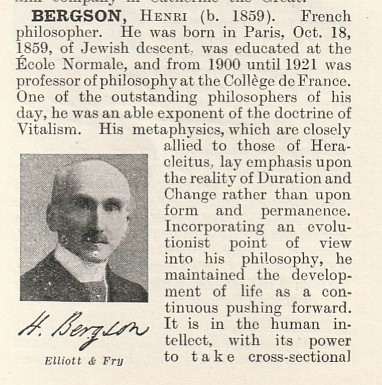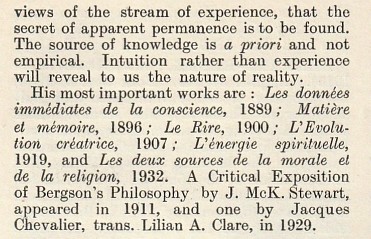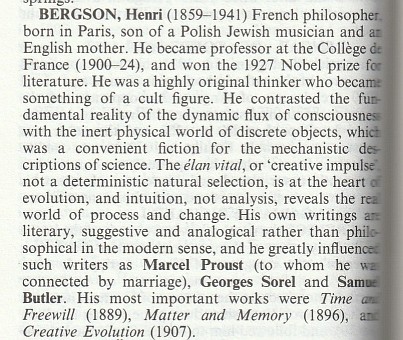Biography of Bergson from c 1935. Ed. J A Hammerton:--


Biog in Chambers 1990:--


Biog in Chambers 1990:--

Henri Bergson. Philosopher or Jewish Activist?
Henri Bergson on Creative Evolution, and Jews promoting political movements with no definite goal. And a few modern equivalents.
Henri Bergson (1859-1941) was born in the year The Origin of Species... was published, a book which of course caused endless controversy. Bergson was about a generation later than Victorian naturalists of considerable observational powers, such as Alfred Russel Wallace (1823-1913), Jean Henri Casimir Fabre (1823-1915) who wrote popular detailed books on insect instincts and oddities, and Ernst Heinrich Philipp August Haeckel (1834-1919).
Bertrand Russell's History of Western Philosophy (first published 1946 in Britain) includes about 8 pages on Bergson, whom Russell noticed presumably because Bergson was popular, influencing for example Bernard Shaw in Back to Methuselah. (I have no figures for Bergson's popularity; quite possibly is was something of a myth).
I've scanned in two summaries of Bergson's life, one from the 1930s, the other from 1990. His principal work seems to be Creative Evolution in French), though his 1900 book Le Rire on laughter and humour made some impact. He wrote on time, matter, free will, perception and other topics in the style of the time.
I wanted to reconsider Bergson as a Jew in France, his Jewishness being something which seems to have been known widely at the time. I'm taking into account here C J Bjerknes Beware of the World to Come, an unusually comprehensive warning of Jewish activity from its earliest times. (The link is to my own review of Bjerknes).
Bergson can be expected a priori to be an academic Jew in France, and conforms to that, at least as far as I know. He is pro-the 'French' Revolution (in fact of course Jewish), and can be assumed to be anti-Catholic and pro-Freemason, if such topics are mentioned. The origin of Catholicism as a Jewish invention must be assumed, along with a huge pile of paid religious dross and accumulations. But he must be expected to adopt Jewish views on political and social questions, for example the assumption that Jews can be allowed anywhere in the world, the Kahal system, synagogues with their rabbinically-arranged selective parasitism, and that 'goyim' are inferior and worse than contemptible. Most of these attitudes are traditionally unspoken, despite their supposed chosen-by-one-God status.
Russell's chapter on Bergson starts by attributing 'irrationalism' to Bergson, and mentioning the Second World War and (in effect) cheese-eating surrender monkeys, in the USA Jewish formulation: Sorel, ... used Bergsonian irrationalism to justify a revolutionary labour movement having no definite goal. In the end, however, Sorel abandoned syndicalism and became a royalist. The main effect of Bergson's philosophy was conservative, and it harmonized easily with the movement which culminated in Vichy. But Bergson's irrationalism made a wide appeal quite unconnected with politics, for instance to Bernard Shaw...
Russell ignores the possibility that the intellect, presumably driven by the brain, unquestionably a biological organ, is driven at least partly by instinct. Considering (for example) Jewish hate for whites, an instinct-operated brain is a perfectly sensible possibility.
Russell (the rest is from his article in The Monist 1912) writes:
Practical philosophies, on the other hand, will be those which regard action as the supreme good, considering happiness an effect and knowledge a mere instrument of successful activity. Philosophies of this type would have been common among Western Europeans if philosophers had been average men; as it is, they have been rare until recent times; in fact their chief representatives are the pragmatists and Bergson. In the rise of this type of philosophy we may see, as Bergson himself does, the revolt of the modern man of action against the authority of Greece ...
Russell seems to seriously believe that philosophers, mainly churchmen, were in honest search of truth. A nice idea, I suppose.
Bergson (translated): "By intuition," he says, "I mean instinct that has become disinterested, self-conscious, capable of reflecting upon its object and of enlarging it indefinitely."
And Russell's words: The essential characteristic of intuition is that it does not divide the world into separate things, as the intellect does; although Bergson does not use these words, we might describe it as synthetic rather than analytic. It apprehends a multiplicity, but a multiplicity of interpenetrating processes, not of spatially external bodies. There are in truth no things: "things and states are only views, taken by our mind, of becoming. There are no things, there are only actions."
Russell would never say these are Jewish attitudes, any more than he ever said Wittgenstein's ideas were Jewish. Discussion of Jews was taboo at that time. Russell would no more discuss Jews than his descendants would say the Queen of England was mentally incompetent and honoured war criminals.
However, Bergson's education probably led him to believe that the Hebraic rubbish he'd been force fed all his young life was—not true, exactly—but unthinkable to even start to challenge. By 'intuition' he must have been describing his own attitudes, in ways socially acceptable to his hosts. However, when dealing with the disgusting beasts of goyim cattle, the readership of his books, he'd want unthinking stupid behaviour, provided Jews were excluded rigorously. What could be better than violent armed military action in which groups of goyim kill each other? And this philosophy was very accurate. English armies fought Boers for Jews; they fought Germans; USA white Americans bombed Germans; Vietnamese were murdered by American simpletons. Bergson seems spot on with all this secretly Jewish activity.
... the great climax [i.e. in Bergson's writing] in which life is compared to a cavalry charge. "All organized beings, from the humblest to the highest, from the first origins of life to the time in which we are, and in all places as in all times, do but evidence a single impulsion, the inverse of the movement of matter, and in itself indivisible. All the living hold together, and all yield to the same tremendous push. The animal takes its stand on the plant, man bestrides animality, and the whole of humanity, in space and in time, is one immense army galloping beside and before and behind each of us in an overwhelming charge able to beat down every resistance and to clear many obstacles, perhaps even death."
About 100 years later, in fact on the 25th July 2020, here's Deanna Spingola of Chicago conversing with me by Internet radio. I wasn't her first choice; I think someone dropped out. It's listed as 3 hours, but is punctuated by very many advertising breaks for products which I fear are of little value.
Deanna is an old-school supporter of Germans in the Second World War, unable to see that Jews ran the USA, USSR, UK, and France and were not at all likely to allow Germans to go their own way. She claims to have done deep research into original documents—but has no information on money transfers between Jews, which were a large part of the system of the war, or "war".
The third part is diversified by two people, apparently Mark Elsis and a woman called something like Myrrh. Elsis spoke keenly on getting a march together of a million or so to Washington, like the 1930s 'Bonus Army', though without a plan. He hoped (he said) that the troops wouldn't shoot. I wasn't enthusiastic about planless activity, but it seems exactly what Bergson would have liked for non-Jews.
Myrrh added pointless interruptions. I've noticed many times that Jews work hard to ensure the parts of Jews in 20th century events are censored as much as possible.
Spingola-West-25-July-2020-hour-1-of-3
Spingola-West-25-July-2020-hour-2-of-3
Spingola-West-25-July-2020-hour-3-of-3
Conclusion: I hope the part played by Jews on philosophy will be recognised. It is absolutely necessary.
HTML, research, scanning, styling, Rae West - first upload 3 January 2022